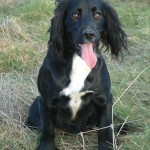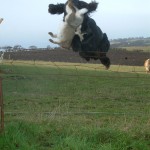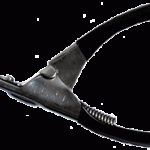Working or Show? What’s the Difference?
This breed, like many others with origins as working dogs, has some genetic lines that focus on working-dog skills and other lines that focus on ensuring that the dog’s appearance conforms to a breed standard; these are referred to as the “working” (or “field-bred”) and “show” strains, respectively.
After World War II, the show-bred Cocker Spaniel increased enormously in popular appeal and, for a while, was the most numerous Kennel Club registered breed. This popularity increased the view that all Cockers were useless as working dogs. However, for many dogs this is untrue, as even some show-bred Cockers have retained their working instinct.
Today, this breed is experiencing a resurgence in usage as a working and hunting dog. Their happy and inquisitive personality makes them ideal assistance or detection dogs. Dogs from working lines are noticeably distinct in appearance. As is the case with the English Springer Spaniel, the working type has been bred exclusively to perform in the field as a hunting companion. Their coat is shorter and ears less pendulous than the show-bred type. Although registered as the same breed, the two strains have diverged significantly enough that they are rarely crossed.
Working-dog lines often have physical characteristics that would prevent them from winning in the show ring, such as heads that are more domed than desired or other traits. This is a result of selecting for different traits than those selected by show breeders. The longer coat and ears, selected for the show ring, are an impediment in the field.
You can find more information and images of the Working Cocker HERE
Grooming
The coat of the English Cocker Spaniel does take care. The coat consists of long guard hairs on the top and a soft undercoat. Grooming styles depend greatly on the purpose, coat texture and colour of the dog. For showing purposes most coats are stripped by hand. Regular grooming is essential and you should get your puppy used to this from an early age. Grooming should be carried out by a professional groomer, your breeder should be able to recommend someone for you but many English Cocker owners learn to groom their own own dogs and find great rewards in doing so.
In addition to the coat, the nails should be trimmed and teeth brushed with a dog toothpaste. The ears require special care. They should be cleaned weekly with a dog ear cleaning solution.
Basic equipment needed: Soft slicker Brush, Spratts 76 comb, nail clippers.
Toilet Training
Unless you monitor your puppy 24 hours a day expect toilet training to take up to 6 months old. When you are at home try and take your puppy out at frequent intervals, especially after eating/drinking and playing. Stay with your puppy at all times whilst outside as they can become easily distracted! Once your puppy has performed use lots and lots of praise this will encourage him on future toilet trips. Never scold your puppy if he makes a mistake and toilets in the house as he will not understand you! Clean up the mess with a mild detergent and try again next time. When you have to leave your puppy leave him in a safe room with plenty of newspaper, or you could use a large crate. Remember, the key to toilet training is patience, patience, patience.
Training & Behaviour
Training and socialisation should begin as soon as your puppy arrives home at 8 weeks old. Teach your puppy in the same way you would a small child, reward good behaviour and prevent your puppy from doing the things you don’t want him to. Socialise your puppy from an early age. Take them to lots of places with different, people, animals and smells, as long as you make sure you do not overwhelm them. If you have young children make sure your puppy has a quiet place to rest and where he cannot be disturbed. This place can also be used as a time out area when both children and puppy get too excited. Remember, you will only get out of your puppy what you put in. Quality time and positive experiences will make a happy healthy dog and a joy to own. You can also enrol your puppy in training classes as soon as all vaccinations have been completed. Consult your Vet regarding vaccination programs.




